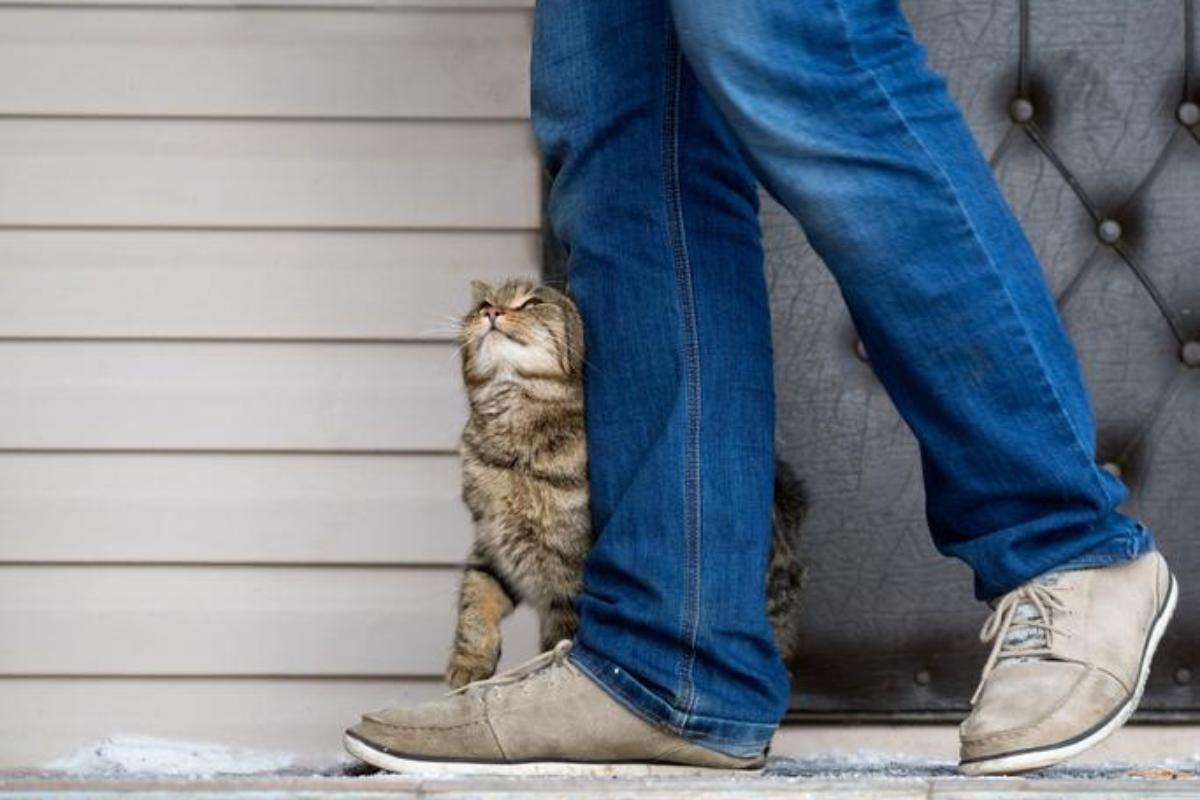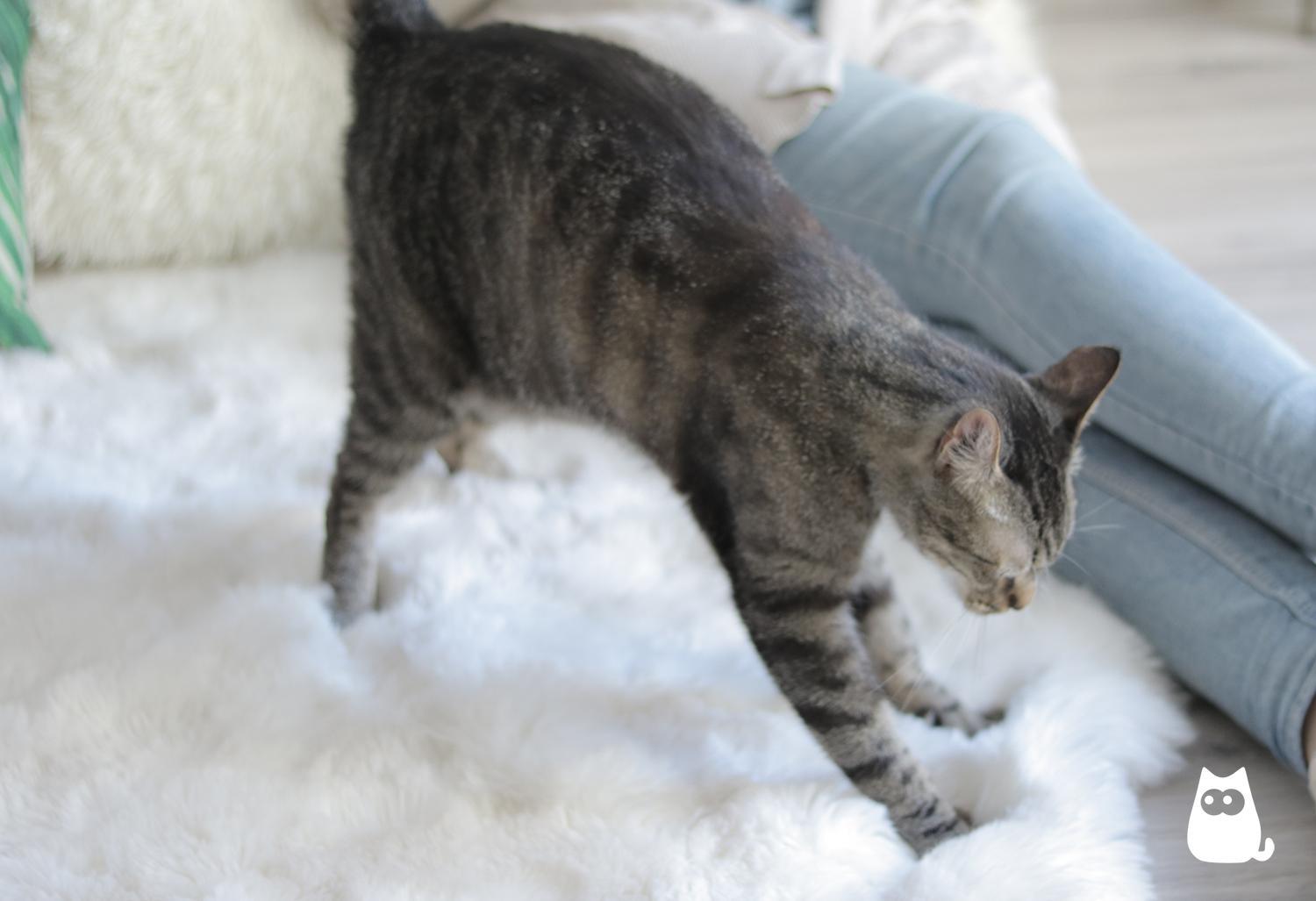How Do I Know If My Cat Trusts Me?



See files for Cats
For any close relationship to work, you will need to build trust. Whether it is a friend, a family member or a partner, living without trust will cause a stressful living environment. The same goes for your pets. If you have recently adopted a cat, whether a kitten or an adult, you will want to know when will they start trusting you.
The first thing you need to know is that building trust is a process. How long it takes will depend on the personality of the individual cat, but they need to get used to their new environment, including their guardians. This period of adaptation requires calm and engendering a sense of security in the cat. If you have ever wondered how do I know if my cat trusts me?, AnimalWised helps you look out for the signs your bond of trust is strong.
Signs your cat trusts you
While they are generally more independent than dogs, cats are still very sociable animals. Some cats may maintain a certain distance even within their family, but most create close bonds of friendship and affection with their guardians. Individual cats may have their own unique ways of expression their feelings and moods. However, there is a general feline body language which cats use to communicate with each other and with us.
When cats feel comfortable in an environment and receive the essential care and love they need from their guardians, they will begin to show their appreciation and trust. How this appreciation and trust manifests itself requires us to pay attention to how they communicate with us.
Our behavior will affect the bond of trust with our cat. This includes both direct and indirect action. A recent scientific review has shown that even a guardian's mood will affect a cat's wellbeing[1]. It is for this reason, we need to ensure our cat has a stable home environment so we can set the basis for trust.
If you want to know more about the relationship you build with your cat, we provide 7 signs a cat trusts you. After we show you these signs, we'll also detail some of the ways you can improve your bond if you are having trust issues with your cat.
1. They want to be with you
One of the major ways you know your cat trusts you is one of the most obvious. They simply want to spend time with you. If there is someone you dislike or distrust, you will probably not want to spend your time with them. The same goes for your cat. Cats only stay in places where they feel secure, such as hiding in dark spaces. If your cat has confidence in you, they trust you are unlikely to hurt or attack them. If they sit beside you on the couch or nap on your lap, they are showing this sense of security.
This might be seen most at bedtime. If your cat wants to sleep with you, whether on your chest or by your feet, it is a beautiful demonstration of the trust they have in you. Not only do they feel like you will not hurt them, but they will feel protected by you. They may also have a practical ulterior motive of wanting to keep warm, but even then they will only do it if the trust is there.

2. They rub up against you
Many guardians wonder why cats are so keen to rub up against you. Whether they are greeting you home from work, waiting on their dinner or simply rubbing for no reason, it can be one of the nicest displays of affection.
There is more to rubbing against you than giving a feline hug. Cats secrete pheromones from different parts of their body. On their head and face they have glands for this purpose. They use this to mark territory as well as their possessions. When your cat rubs against you, they are showing they love you, they trust you and that they consider you part of their family.

3. They bring you presents
With their lack of opposable thumbs, cats are notoriously bad at folding wrapping paper. For this reason, the present selection they choose to bring you is fairly limited. This doesn't mean they won't be happy to bring you a gift. It does mean it will usually be in the form of an unwrapped dead animal. There is still scholarly debate over the exact reason why cats bring you dead animals and other presents, but it is generally considered to be part of the teaching habit.
Mother cats will show their kittens how to catch and kill prey. When they bring you a dead animal, they are probably trying to show you they care for your well-being. If they didn't trust you, there would be no point in doing this. If the cat brings you a present, it means they think you are part of the family. It also may mean they think you are bad at looking after yourself.

4. They let you stroke their belly
The behavior of cats turning over and exposing their underbelly for petting is a more common behavior in dogs. This is because dogs generally don't have the same trust issues of cats. If a cat does this, it is showing an extreme state of relaxation and they have a great level of trust in you. This is because cats generally do not like their bellies being touched. It makes them feel vulnerable and they often will attack people, even guardians, if they go near it.
Even cats which do have high levels of trust in their owners will not let their belly be touched for any length of time. It is wise not to take it personally. If they do, however, then the trust bond is very strong.

5. They knead you
Many people find cats kneading you to be one of their most curious behaviors. When we think about the reason, it is less mysterious, but still fascinating. Cats as kittens knead their mother's nipples so that they will produce milk. It is a natural movement which shows the close bond cats have with their mothers.
Kneading is a kind of contact which generates feelings of pleasure and well-being. The bond of trust is strongest between parent and offspring. If your cat kneads you, it is likely because they have a similar feeling of trust with you. After all, you provide them with sustenance and security. It is similar to how cats generally do not meow to other cats, but they will do it to humans.

6. They raise and twist their tail
Other than the aforementioned meowing, cats make a wide variety of vocalizations as a means to communicate. However, it is their body with which they communicate the most. This body language expresses moods and feelings in a way only other cats can truly understand.
This feline body language is a very sophisticated and complex system, incorporating many postures, gestures and expressions. The movement and position of the tail can be one of the most clear signs. It is particularly good at declaring how they feel in relation to you. If your cat raises their tail and twists the tip slightly, it is a clear sign they trust you. This behavior is also visible in communities of cats living together in relative harmony.

7. They purr
Cats purr for many reasons. Such reasons for emitting this vocalization for various reasons tend to depend on age and the context in which it is occurring.
Kittens purr when they feel pleasure in suckling at their mother's breast, but they have also been known to do it when they experience fear or confusion at some unknown stimuli. Their mothers also use this sound to calm them during childbirth and guide them reassuringly during their first days of life. Adult cats tend to purr mainly in positive situations, i.e. when they feel confident, happy and relaxed in the company of their human guardians. So, if your cat purrs while they are with you, especially if they also rub against you, then it is a pretty sure sign you have their confidence.

How to gain the trust of a cat
As we mentioned earlier, adapting a cat to a new home is a process. The most important variable is the personality of the cat themselves, but every cat will need to feel safe. However, time alone is not all. We need to devote ourselves daily to strengthening our bond, but we need this time to be well spent. This means positive interaction which includes:
- Be patient: one of the worst ways to harm your bond with your cat is to push them into interacting when they are not ready. If we pick them up, force them to be with us or stop them from getting away, they may feel threatened and it will be even harder to build trust. You will need to let them come to you and be passive until they are able to trust you.
- Positive reinforcement: when they behave appropriately, we need to show a cat encouragement through positive reinforcement. This can be in the form of petting, providing treats or even using reassuring tones with our voice. This is the most effective way to train cats while building up a bond of trust at the same time.
- Avoid punishment and scolding: just as using positive reinforcement can build trust, scolding and using violence will take it away. Cats do not understand our words, so they will often not even know what they are being punished for. In this sense, it is not only cruel, but it is counterproductive. The trauma you cause is likely to result in behavioral problems.
- Make time for play: playing with cats is fun, but it is also practically very important. It allows the cats to be physically and mentally stimulated, but it also allows you to build a bond. Playing is a behavior cats start with their mother and siblings, so a cat choosing to play with us is a clear sign they trust us like family.
- Give them lots of love and affection: one of the main reasons we adopt a cat is to enjoy building up a relationship with them. Providing love and affection is rewarding for both cat and guardian, building trust between them.
We have more information in other articles on our site, but these general guidelines will help you to build trust. You can also take a look at our video below to help reaffirm this behavior:

If you want to read similar articles to How Do I Know If My Cat Trusts Me?, we recommend you visit our Facts about the animal kingdom category.
1. Turner D. C. (2021). The Mechanics of Social Interactions Between Cats and Their Owners. Frontiers in veterinary science, 8, 650143.
https://doi.org/10.3389/fvets.2021.650143












